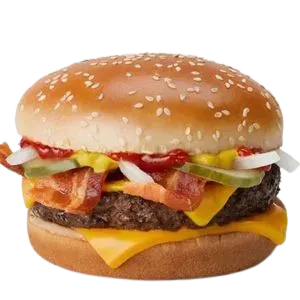Cheeseburger Price & Calories

Cheeseburger
Cheeseburgers have cemented their place as a beloved staple in the realm of fast food. Their combination of juicy beef, melted cheese, and fresh vegetables tucked between soft buns satisfies cravings worldwide. Understanding both the financial cost and caloric impact of these burgers is essential for informed consumption.
Ingredients
Allergens
Nutritional Report
| Nutrients | Per Portion | Percentage Daily Value |
| Sodium (Na) | 720mg | 31% |
| Dietary Fiber | 2g | 6% |
| Added Sugars | 5g | 10% |
| Total Sugars | 7g | – |
| Potassium (K) | 220mg | 4% |
| Calcium (Ca) | 100mg | 8% |
| Trans Saturated Fats | 0.5g | – |
| Saturated Fats | 6g | 29% |
| Iron (Fe) | 3mg | 15% |
| Cholesterol | 40mg | 14% |
| Vitamin D | 0 mcg | 0% |
Review
The cheeseburger, born in the early 20th century in the United States, evolved from a simple hamburger by adding a slice of cheese. Its popularity grew rapidly, becoming a symbol of American fast food culture.
Health Concerns
Consuming cheeseburgers regularly can lead to excessive calorie intake and potential health issues such as obesity and heart disease. Opting for leaner meats, whole-grain buns, and minimal cheese can mitigate these risks.
Popular Chains and Their Offerings
Major fast-food chains like McDonald’s, Burger King, and Wendy’s offer varying cheeseburger options. Prices and calorie counts differ among these chains, reflecting their menu diversity and customer demographics. Read Also: Sausage McMuffin with Egg Meal Price:
Frequently Asked Questions
Conclusion
Cheeseburgers, with their blend of taste and convenience, continue to captivate consumers globally. Understanding the interplay between price and calories empowers individuals to make balanced dietary choices while appreciating this enduring fast-food favorite.






